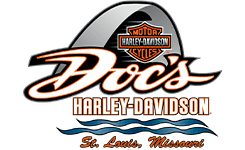How to Select A Motorcycle Helmet
 A motorcycle helmet should ideally be bought along with the bike or, at least, before your first ride. It is the most important piece of riding gear and you should give it some thought before you buy one. Doc’s Harley-Davidson is proud to be the leading motorcycle helmet dealer in Kirkwood, MO and we want to help our patrons get the right gear!
A motorcycle helmet should ideally be bought along with the bike or, at least, before your first ride. It is the most important piece of riding gear and you should give it some thought before you buy one. Doc’s Harley-Davidson is proud to be the leading motorcycle helmet dealer in Kirkwood, MO and we want to help our patrons get the right gear!
Read on to learn more about helmets and when you want to check out helmets for sale near St. Louis or St. Cloud, contact us and talk to one of our helpful staff members! We’ve already discussed the different types of helmets here so also check that out before you make a selection!
Parts of a Motorcycle Helmet
There are four main parts of a helmet. The outer shell reduces the impact before it reaches your head. It’s made up of fiber-reinforced materials that can contract during impact. Next is an impact-absorbing liner often made of styrofoam. It works to absorb the shock and deflect the hit’s power from your head.
Next comes the comfort padding, which is the layer that rests against your head. It makes wearing the helmet more comfortable and helps the helmet fit snug. Finally, there is the retention system (otherwise known as the chin strap). Its purpose is to keep the helmet on your head.
Crash Test Ratings
When browsing motorcycle helmets for sale, you may notice crash test ratings on the packaging. These measure how the helmets perform in a mock crash scenario to hopefully give the consumer some guidance on the coverage they can expect in a crash.
Two types of organizations conduct these tests: government agencies (like the Department of Transportation) and non-profits (like Snell, founded after sports car racer Pete Snell died from head injuries). Be sure to check for crash test ratings. There are too many solid helmets on the market that have undergone these tests to justify buying a helmet without these ratings.
These tests cover numerous things including:
- Impact: how the helmet absorbs the shock
- Penetration: how the helmet stands against hitting sharp objects
- Retention: how well the chin strap stays closed without popping open
- Peripheral vision: (how much you can see on each side
Finding the Right Fit
An inexpensive yet well-fitting helmet can actually protect you better than an expensive option that does not fit right. The most important part of helmet shopping is finding a good fit. You want it to feel slightly tight but without too much pressure. Even when a new one is broken in, it should never feel loose.
Begin by figuring out your measurements. Your head size determines how big of a helmet you will need. Your head shape decides how the helmet lines up with your forehead, jaw, etc. You can find easy sizing charts online before you head to the store.
Conduct a few tests while trying a helmet out. Move your head from side to side. The helmet should not wobble or wiggle. Roll your head forward. The helmet should not slide off. Wear the helmet for several minutes. Make sure it doesn’t pinch your jawline, feel stuffy, leave red spots, or make you sore in any way.
The more often you plan to wear your helmet, the more important comfort will be. Those who ride their motorcycles often (like commuters) and those who embark on extended trips should prioritize comfort the most. If you often ride with others, you may want a helmet with Bluetooth capabilities that allow you to communicate with each other.
Helmet Care
It is rather easy to take care of a motorcycle helmet. You will need to clean it every so often as it’ll get dust, dirt, and grime on with each ride. Use a mild soap (since petroleum-based products can make the outer shell decompose). Clean off your face shield whenever it gets vision-impeding gunk on it.
There are two situations that demand helmet replacement. The first is any type of injury to it, such as a high impact. This can cause damage to the integrity of the helmet, even if it appears fine. The second is after five years of ownership. Eventually, the helmet’s bindings start to wear down and lose their ability to keep the helmet strongly kept together. While it can be tough getting rid of a helmet that looks fine on the outside, both these scenarios pose safety risks.
We hope you now have a better understanding of what to look for! If you need more help or are ready to browse motorcycle helmets for sale in Kirkwood, MO, contact Doc’s Harley-Davidson and one of our friendly staff members will gladly assist you! We’re proud to be the preferred motorcycle helmet dealer for St. Louis and St. Charles!
